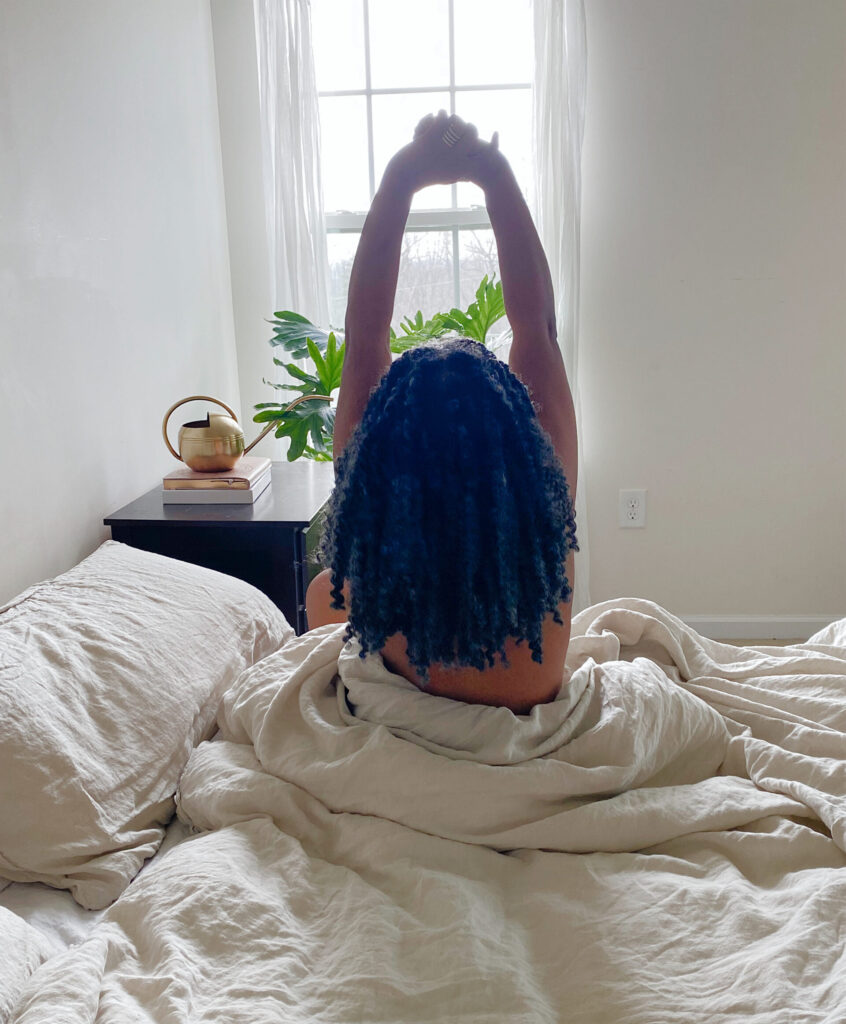There’s no doubt that the menopausal process can take a toll on your sleep routine, with night sweats sometimes making it difficult to get consistent and quality sleep. Trust me. I know all too well how a night sweat can wake you out of peaceful slumber. Though I’m in post-menopause now, it still happens. Albeit, not as frequently. Call it beauty sleep. Call it restorative sleep. Whatever you call it, know that quality sleep is necessary for optimum health and well-being. In this blog, I’ll be sharing four ways sleep supports the health of your skin.

As you may already know, the decline of estrogen and progesterone can cause skin dryness, itching, and irritation to substances and some fabrics. So taking appropriate action to maintain the health of your skin during the menopausal phase is very important.
Experts suggest a maximum of seven to eight hours of sleep. For me, seven works optimally, but I can also function productively with six hours. While you sleep, many biological processes take place, including ones that maintain the health of your skin. Here are a few reasons why getting quality sleep should be a top priority on your menopausal care list.
4 Ways Sleep Supports Your Skin
Renewal
When you’re sleeping, the skin cells renew at twice their regular rate. Though the numbers are inconsistent, it is a fact that somewhere between the hours of 9 pm and 2 am, cell division occurs and peaks. That means new cells are being made to replace old aging ones. Good for the skin? Yeah!
Repair
The skin is our largest organ and is made up of over 1 trillion cells. During sleep, there is a reverse in cellular damage. Cortisol drops and repairs damage that may have occurred during the day, i.e. UV. Lack of sleep causes cortisol levels to rise and this can cause inflammation in the body, which can then cause symptoms to show up on the skin. So aiming for at least 7 hours of sleep nightly can be most beneficial to your skin and overall health.
Collagen
As we get older collagen begins to decline. According to the American Academy of Dermatology, women lose approximately 30% of their collagen within the first years of menopause. After that, the decline is more gradual. Women lose about 2% of their collagen ever year for the next 20 years. Collagen is a protein found in the skin. It helps cells stick together and gives our skin/face a plump, youthful appearance. However, as we age, collagen begins to decrease. In fact, collagen begins to slowly decrease around the age of 25. Don’t panic. Slowly. While sleeping the skin increases collagen production, which supports plumper skin and as a result, fewer fine lines and wrinkles. Yes, wrinkles are beautiful and proof of a life well-lived, but let it happen naturally, not because of a lack of sleep.
Melatonin
Melatonin protects the skin from free radical damage. Basically, it stimulates the body’s production of antioxidants while you’re sleeping. For this reason, melatonin is known as the “anti-aging” antioxidant. We prefer to call it a “well-aging” antioxidant. We can’t stop the aging process, nor do we want to (speaking for us). But with increased melatonin production when we’re sleeping, cells can enjoy optimum conditions to thrive.
During menopause, melatonin production also declines, and this can leave the skin more susceptible to UV harm and the visible signs of damage like sun spots for some and pre-mature wrinkling.
Don’t forget to sign up for my newsletter for notifications. I’ll be posting another blog on ways to improve sleep. The bottom line is that quality sleep supports your skin’s health, especially during the menopausal phase. How is your quality of sleep? What tips can you offer for restful and restorative sleep?
liked this post? leave a comment!